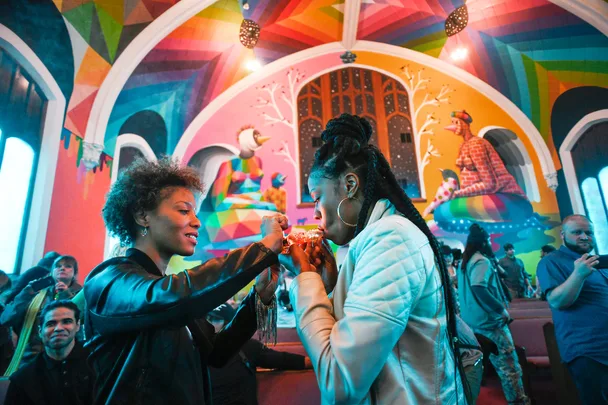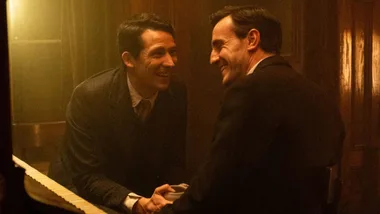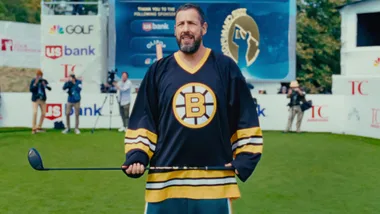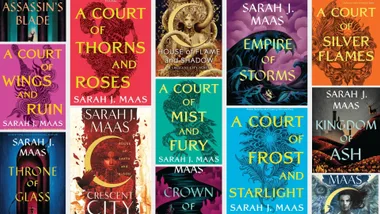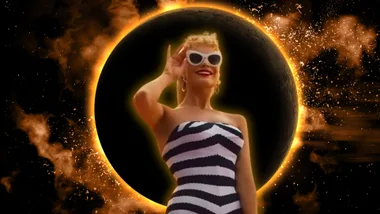It’s Friday night and I’m at church getting stoned. Around me, congregants of all ages are pulling colourful pipes and carefully rolled joints from their bags and pockets, lighting up and inhaling slowly, with purpose, before passing their paraphernalia down the pew. Dudes in baseball caps mingle with young women in sundresses; retirees rub shoulders with hipsters; a guy in a “Hemp Hustler” T-shirt shimmies down the aisle. When the slender, well-dressed woman sitting next to me hands me a joint, I take a drag. The mood is exuberant, like a party’s getting ready to start.
Entering the rainbow-streaked sanctuary of the International Church of Cannabis – which looms large amid the neat, unassuming rows of houses in this sleepy, residential neighbourhood in Denver, Colorado – feels like having some kind of religious fever dream, or like visiting the Sistine Chapel on acid. Colour literally drips down the walls. Before the church opened its doors in April 2017, Spanish painter Okuda San Miguel spent six days bringing to life a wildly psychedelic vision involving massive creatures with beaks, wings and sparkling eyeballs.
Tonight, puffs of smoke float up into the kaleidoscopic ceiling overhead as church co-founder Steve Berke, 38, a former all-American tennis player, ascends to the podium in Converse sneakers. Behind him are two blue plush-velvet chairs shaped like hands in a peace sign. At cannabis church, there are no hymns, no Bible; there’s not even a pastor. (This evening, we’ll hear from two cannabis activists who host a web series called Pot Talk on WorldViral TV.)
The house religion is “Elevationism”, described on the church’s website as the belief (or “lifestance”) that weed can accelerate and deepen a person’s individual spiritual journey, whatever that happens to be. From the evidence in the chapel, it truly is a come-one, come-all creed. Some “Elevationists” practise other religions, too (Berke himself is Jewish, another of his four co-founders grew up Evangelical). Here, believers don’t have to “convert” to anything; they just have to fill out an online application confirming that, yes, cannabis is a “spiritual sacrament” in their life.
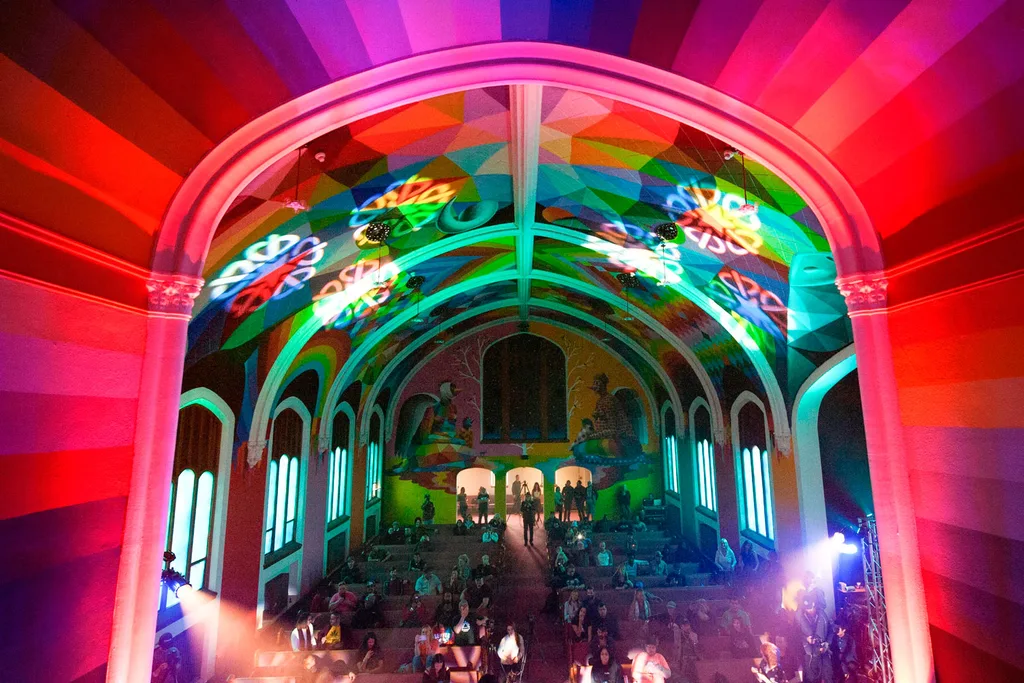
Why they would bother to do this, and not just get stoned on their own couches at home, is the question I’ve come to answer. According to Lucy, 28, a yoga teacher who sometimes leads classes at the church, “Churches by nature have a high vibrational energy. Consuming in a community, in a ‘church’ setting, makes it an even more powerful experience.”
Through the haze of smoke, I see Berke strike a match and benevolently invite congregants to light joints on his candle. “We support each other on our individual spiritual journeys,” he says, “and come together to burn our sacrament.” At cannabis church, religious rituals are stripped of guilt and recast as a communal self-help experience – which is maybe what they were always supposed to be anyway. The crowd goes wild, shouting “Amen!” and “Huzzah!”
R.E.M.’s 1991 hit “Losing My Religion” turned out to be weirdly prescient: young people have been turning away from organised belief systems since the early ’90s, disillusioned by sex scandals and cultures of intolerance. In Australia, “no religion” is the most common religious status, while in the US nearly four in 10 young adults claim no religious affiliation. But that doesn’t mean they’ve stopped seeking spiritual fulfillment. Alternative forms of soul sustenance, from yoga to astrology to socially conscious jobs, have gone mainstream. Weed, bolstered by a growing acknowledgment of its health benefits and a wave of legalisation (recreational use is now legal in Canada and across 10 US states), has transcended its reputation as the preferred party drug of slackers and joined the firmament of wellness-based options available to the enlightened young spiritual seeker.
Weed and church are actually not the strangest bedfellows – cannabis has a long religious history. Its active ingredient, THC, interacts with the sensory perception, altering thoughts and feelings, and affecting levels of neurotransmitters such as dopamine and norepinephrine, which can lead to sensations of pleasure and euphoria (and sometimes anxiety). Spiritual traditions ranging from Hinduism to Rastafarianism have used it; some believe it’s even endorsed in the Bible (“kaneh-bosm”, a key ingredient in Jesus’ anointing oil, may have been an early term for cannabis).
Today’s pot parishioners can already be found all over the US, at the Coachella Valley Church in San Jose, the First Cannabis Church of Florida, the First Cannabis Church of Logic and Reason in Michigan, Greenfaith Ministry in Nunn, Colorado and the First Church of Cannabis in Indianapolis. Many of these groups meet online or on private property, not in actual churches, since they’re limited by local laws about public consumption.
The International Church of Cannabis is the rare one where you can actually smoke in the church itself, provided you’re at least 21, show ID at the door, and have completed the aforementioned online questionnaire. (Becoming a “member” is what makes consumption here legal, since the church is a private space.) And you can’t buy or sell on the premises; this is a strictly BYOC situation.
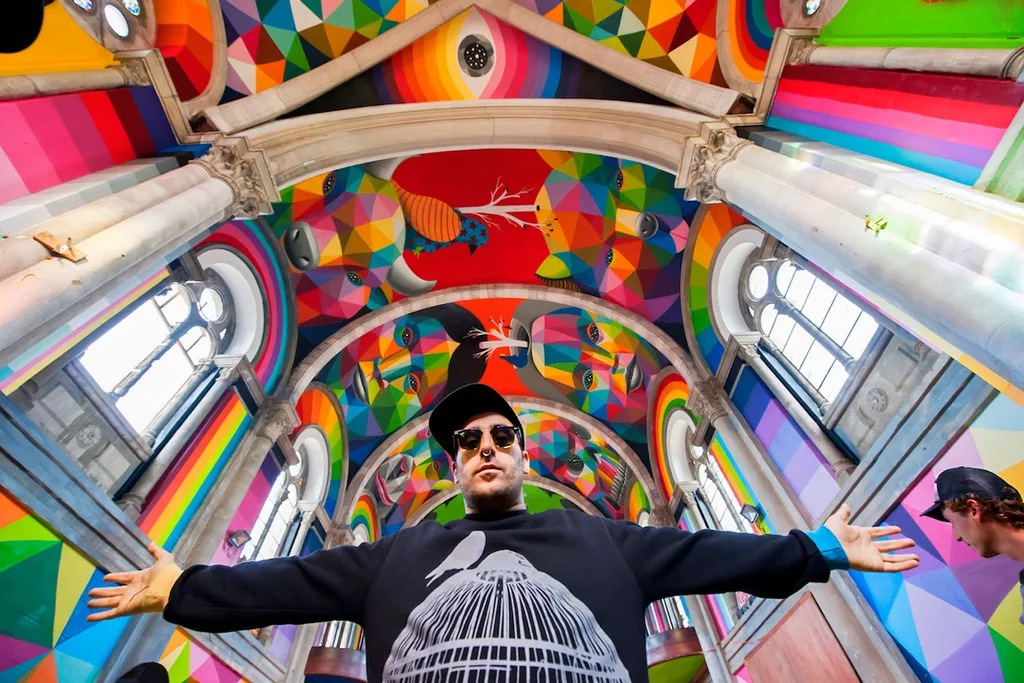
Predictably, on this Friday night in Colorado, I spy a few tourists at the service, and some bros who probably just want the thrill of getting high in a church (Berke says the organisation has more than 7500 official members, and about 40 show up regularly). But most seem to be legitimately searching for a sense of community and acceptance that might have been missing from the congregations they grew up in. During the service, people come and go freely, close their eyes and rest, and carry on conversations. Plenty of them approach me to introduce themselves; I can’t tell if they’re proselytising or just being friendly (or have heard I’m a reporter).
Samantha, 30, a fair-skinned redhead who owns a crochet business called Mile High Stitches, tells me that she moved to Denver from East Texas, “where you’re either Christian or going to hell”. She first visited the church more than a year ago and keeps coming back. “It makes me feel like I’m not alone or lost,” she says. “That there’s a divine purpose to keep pushing forward.” A vivacious white-haired woman named Beth Ann, the self-described “church grandmother”, taps me on the shoulder to inform me that cannabis helped with her Parkinson’s after she moved here from a Florida retirement community (it also saved her marriage, she intimates, motioning towards her husband).
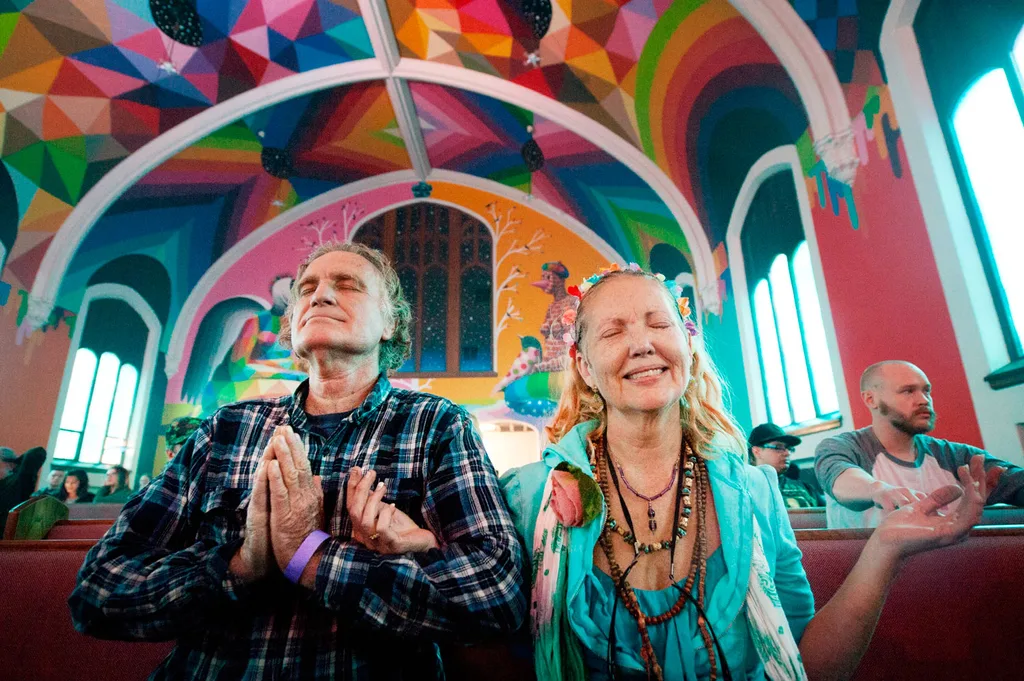
An hour in, the vibe at the church is trending kind of sauna-ish. The AC is on the blink, so paper fans wave furiously. One woman reclines sideways on her pew, her legs stretched across her boyfriend’s lap like she’s at an outdoor music festival. As I inhale hot, slightly skunky air, everything fades to a soothing backdrop, warm and hazy as well as fragrant and safe. I’m beginning to see the allure of all this: the mix of learning and activism, the inclusive, participatory feel of a house party. The extreme, pervasive chill. Some people listen. Others appear to zone out in their pews, deep in their own transformative experience.
Lili, 21, an ethereal blonde who grew up in Finland and one of Berke’s interns, tells me later that her first time at the church was almost like a baptism. “I remember sitting on one of the benches alone, after hours, looking around in awe just thinking, ‘I can’t believe I’m here,’” she says. Raised atheist, she didn’t know this kind of feeling was possible inside a religious institution. “I’ve always tried to smoke joints in really beautiful places,” she says. “But it’s interesting that you can get that same experience in the city, in a building. It puts things into perspective. Where you are right now, how amazing this is.”
Berke’s co-founder, Lee Molloy, says the church currently breaks even by fundraising, renting out its space for events, and selling swag at a gift shop on the ground floor. There, amid life-sized Teenage Mutant Ninja Turtles, visitors shop for stuffed toys, souvenirs and “High Priestess” T-shirts. At the service, a collections bowl circulates, just like in any other church, and parishioners toss in a buck or two to contribute to the new air conditioner.
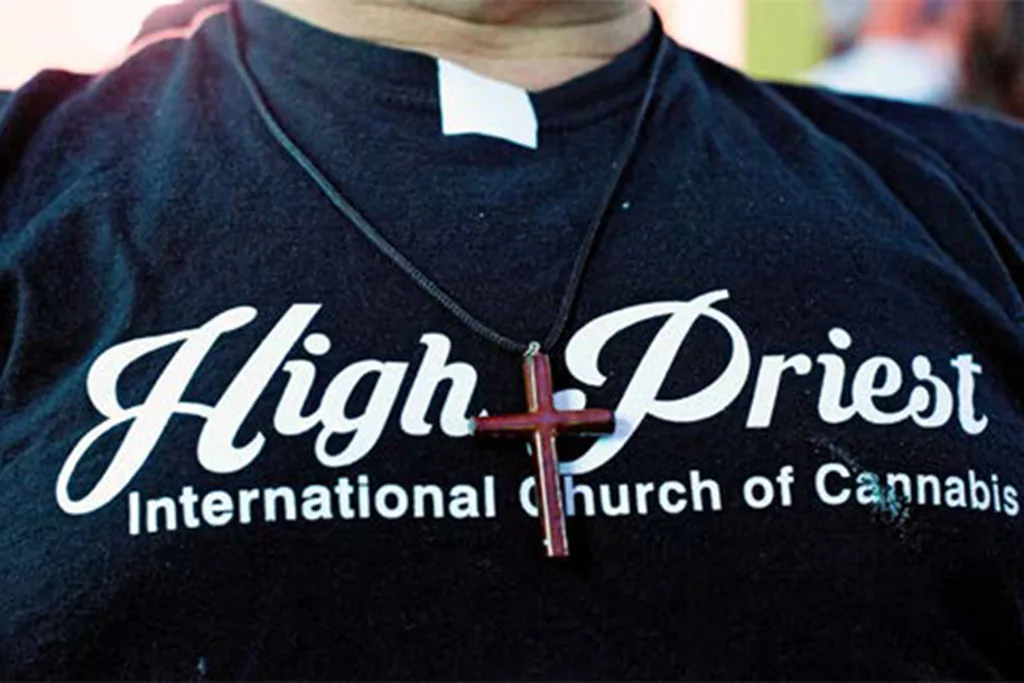
There’s a reflexive self-consciousness here, like they know how this looks, a bunch of mostly white seekers colonising old churches with their weed. “It’s not like we’re worshipping the plant,” clarifies Samantha. “It’s a tool.” The religious vibe actually encourages people to take their hash habits more seriously. “The spirit of cannabis is a master healer,” explains Elizabeth, 38, the church’s volunteer and events coordinator. “It has the power to bring positive change. But if you abuse it and use it unconsciously, it can take your life force” (not to mention make you mow through a bag of Doritos). “A lot of people perceive the name and mission as a kind of joke, but it’s not,” says Lili. “I believe it’s the perfect addition to your physical and mental wellbeing.”
By this time, the speakers have wrapped up, and two twenty something guys with guitars are strumming out the first few bars of “About a Girl”, which reverberates through the chapel (those church acoustics, though). Behold, tonight’s musical accompaniment: a Nirvana cover band. A couple of young women rush the stage like they’re seeing Kurt Cobain in the flesh. Beth Ann comes dancing down the aisle, earrings bouncing. A bunch of us stand up and sway awkwardly in the pews.
It all feels a little bit strange, but it’s really no weirder than a Catholic funeral I recently attended, with its ringing bells, chanting, incense and robes. In a way, religion has always been a trip. This version just owns it, and doesn’t ask you to buy into anyone’s story but your own. When the Nirvana set ends, with “All Apologies”, the crowd cheers wildly and demands an encore. It could be the weed, but I realise that I’m grinning from ear to ear.
This article originally appeared in the September issue of marie claire magazine.
